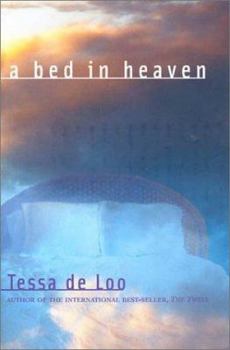Bed in Heaven-C
Select Format
Select Condition 
Book Overview
A woman falls in love with a man who may or may not be her brother in this searing novel by de Loo (The Twins), which traces the effects of WWII on a fractured Hungarian Jewish family. Like de Loo's... This description may be from another edition of this product.
Format:Hardcover
Language:English
ISBN:1569473161
ISBN13:9781569473160
Release Date:February 2003
Publisher:Soho Press
Length:144 Pages
Weight:0.60 lbs.
Dimensions:0.6" x 6.5" x 8.7"
Customer Reviews
1 rating
MUSINGS ON THE NATURE OF MORALITY...
Published by Thriftbooks.com User , 20 years ago
I haven't read Tessa de Loo's previous (and highly acclaimed) novel The twins - I just happened to spot this one the other day, and it looked interesting. In this slim (120 pages) volume, de Loo tackles some pretty large issues through her characters' story - and, as is usually the case when this is attempted by an author, leaves the reader with at least as many questions as answers. Along the way, however, she tells a compelling story that gives the mind a few things to chew on afterwards.The narrator of the novel - Kata, a woman of Hungarian Jewish heritage - begins the story by announcing that she has just buried her father, revealing almost in the same breath that she is lying in bed with his son. The story of their mutual desire for each other, along with the tangled web of their history (both together and separately) is told over the length of the book - sometimes in the present tense, sometimes looking back at the past through direct or recounted memories of the World War II era and before. Facts that have been accepted by family members and acquaintances for decades are suddenly thrust into the shadows of doubt and outright refutation. It becomes clear pretty quickly that the nature of `truth' varies with perspective - as does the idea of morality. How can one decide if a situation is morally correct or not if all of the facts are not known, if several versions of the events in question exist - all equally valid in various minds and memories? One bases ones beliefs and actions on what one knows - if it turns out later that things were not as they seemed, is the morality reversed or altered?Kata's father has always been a quiet man, a bit of an enigma, an immensely talented cellist who moved his listeners to tears yet never achieved the international notoriety that was deemed to be his due. Secrets begin to be unlocked when his brother Miksa comes to stay with the family - Miksa is dying, and has journeyed to Holland from Hungary to see his brother one more time, and to deliver some family heirlooms into his hands: photographs of people that young Kata has never seen, as well as a portrait of Kata's grandmother. The face in the portrait looks remarkably like the young girl - this leads Kata to begin to wonder about all she has been told about her ancestors, and further events transpire that cause her to question if she really knows her father at all.She first meets Stefan when she is a college student. Two other girls take her to Stefan's apartment - the four of them wind up sharing a bed for the night, but Kata is more embarrassed than excited by the events (although she has to admit that her desires are stirred). The moment she meets Stefan, she senses something about him, a nagging feeling that she knows him somehow. He commissions her to paint the ceiling of his apartment with images of the sky and clouds - `heaven', he calls it. One day, his mother drops by - as soon as she discovers Kata's name, she mentions that she hi






